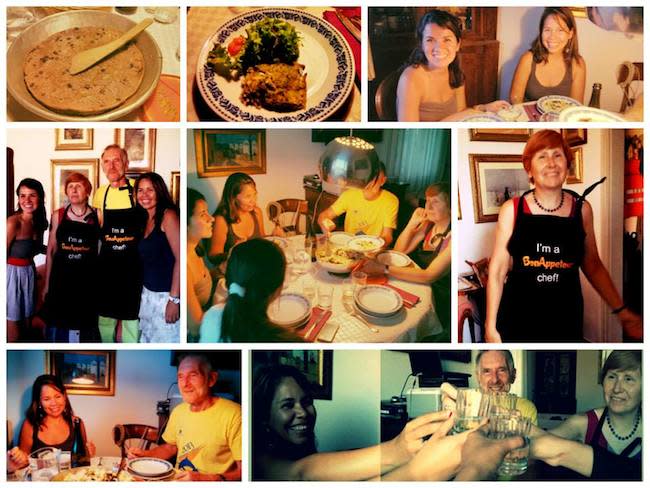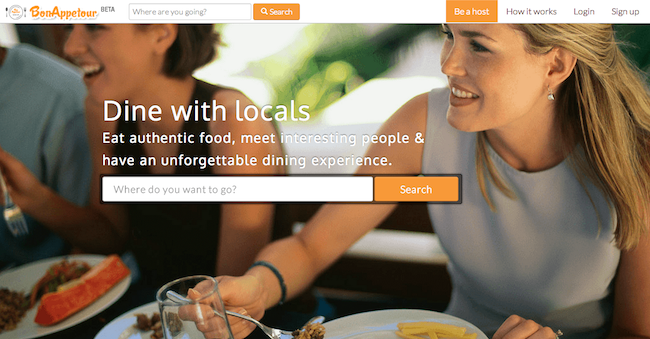Airbnb experimenting with home dining, is this doom for similarly serviced companies?
You know how they say the fates of some companies are entirely dependant on what bigger companies are doing?
For example, when Apple released their latest iOS 7 operating system to include a new flashlight feature, Apple almost instantly killed all the flashlight apps on the app store. An App Store search for flashlight yields 1273 results; that’s 1273 apps that will basically perform the same function as the new operating system, and will now be useless.
Seems like we might be seeing the same with a few companies in the home dining space.
Airbnb experiments with group dinners for strangers
Earlier last week, it was reported that home rental network Airbnb is experimenting with a plan to turn homes into restaurants. According to Reuters, the San Francisco pilot project will let diners eat at a local resident’s home for $25 for a 3-course meal. Marissa Coughlin, an Airbnb spokeswoman, said the company is “always experimenting with new ways to create meaningful experiences” and declined further comment.
For those unfamiliar with Airbnb, it allows anyone to simply list their properties for rental. Currently, there are more than 1 million guests staying in accommodations listed on Airbnb globally.
With the new milestone, it seems timely and natural for the company to experiment the Airbnb for homecook food, where hosts can also extend their meals to guests, bringing a more unique experience to travellers, make travel much more, human.
What does this mean for other “Airbnb for home cooked food” companies?
Of course, the idea isn’t novel, and while Airbnb has been focusing on getting more listings as well as expanding its services all over the world, companies such as KitchenSurfing has been thriving in the Airbnb for home cooked food vertical where the platforms allow anyone to join the platform and offer their services for in-home meals. Kitchensurfing launched quietly in New York one year ago as a marketplace for private chefs. Since then, thousands of chefs have joined, and more than 100,000 people have experienced a Kitchensurfing meal, according to CEO and founder Chris Muscarella.
Nearer to Southeast Asia, two companies are also focusing on this space, Singapore based BonAppetour as well as Malaysia based PlateCulture.
Both BonAppetour and PlateCulture are simple platforms that connect travelers with local hosts who love to invite guests over to their homes to join them for a unique dining experience. For travellers, you get to experience authentic home-made food in homes of the hosts, learning more about the culture of travel destination and meeting new people. For the hosts, you can monetize your cooking skills and at the same time sharing your home culture with travellers around the world.
Image Credit: BonAppetour
Southeast Asia based BonAppetour and Plateculture are not worried about Airbnb
With Airbnb now extending this service to its hosts, would this kill off businesses around the world which are currently offering the services?
Both BonAppetour and PlateCulture are hopeful.
“For such a concept to work, we really need to be experts and to fully understand the connection between food and people,” BonAppetour cofounder Inez Wihardjo told Vulcan Post.
“It is something that we have solely focused on doing for the past two and half years. I don’t think it is something that can be done overnight at a snap of a finger. I understand that it is a very natural thing for Airbnb to add new verticals and enter this space. An average joe can start renting out his extra space and become an Airbnb host, but for a home dining experience, it takes more than that,” said Inez.
“For a truly memorable dining experience, the host needs to have exemplary culinary and hospitality skills. This is the value that BonAppetour upholds in handpicking and inviting selected homecooks to be a part of our host community. We want to deliver nothing less than a 5 star home dining experience,” Inez added.
Also Read: [WOW] Ronaldinho puts up his apartment for rental on Airbnb for World Cup 2014
When we chatted with Bon Appetour in December last year, there were over 200 homecooks available to host travellers on BonAppetour.
Malaysia based PlateCulture’s CEO Audra Pakalnyte also shares the same sentiment: “It’s exciting to see such players as Airbnb moving into shared economy not only for accommodation but other aspects as well including home dining. This shows that the market is maturing for such service. This is great boost for PlateCulture and other similar home dining platforms to grow and develop the service further.”
Image Credit: PlateCulture
Both PlateCulture and BonAppetour definitely have a lot of positivity in their team. Of course, it will take some time before Airbnb fully launches its home dining service to its host globally, and it will take even longer for the service to pick up a critical mass in Southeast Asia, especially in Singapore where subletting is illegal.
Just last week, it was reported that two home owners had their Housing Development Board (HDB) flats seized for issuing short-term rentals. According to HDB’s website, subtenants in Singapore must not be tourists. Owners of 1- and 2-room flats in Singapore are also not allowed to rent only their bedrooms; they must rent out their flats as a whole. Prior approval for HDB is also required for anyone keen on renting out his whole flat.
Despite the rules, Airbnb still thrive in the Southeast Asia region, especially in Singapore: Airbnb’s Singapore website showed more than 1,000 rentals available.
If Airbnb does expand its home-cook service to hosts in Southeast Asia, though it might take some time, it will definitely give both PlateCulture and BonAppetour a run for their money, especially since Airbnb has a strong financial backing: it has now closed its latest round of funding: $500 million, led by private equity firm TPG, at a $10 billion valuation.
That’s a lot of marketing dollars, something which both PlateCulture and BonAppetour might be lacking in for now.
However, they are making up for it through early user acquisition as well as their knowledge and familiarity with the local markets.
Also Read: No More Room For Home-Rental Websites in Singapore?
The post Airbnb experimenting with home dining, is this doom for similarly serviced companies? appeared first on Vulcan Post.







